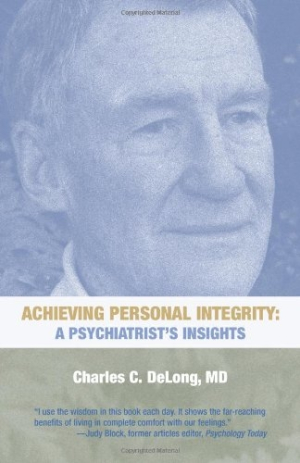Achieving Personal Integrity
A Psychiatrist's Insights
Psychologists and psychiatrists work intimately with patients to conquer their private demons, not to cure society’s ills. But after thirty years of practicing psychoanalytical therapy, Dr. Charles C. DeLong is convinced there is a connection between the therapist’s couch and improved human relationships. In Achieving Personal Integrity, the retired psychiatrist shares his therapeutic techniques and shows how using these tools can create a better world.
Integrity, in DeLong’s vocabulary, is about completeness. An integrated personality, he suggests, is one that is so grounded that it is impervious to environmental influences. If one has personal integrity, one is not threatened by anger in others. An individual with personal integrity is able to help an angry person through what DeLong calls “active understanding.” By providing “calm and connected” attention, the active listener can connect with the troubled person and help them become more integrated. Thus, integrity breeds further integrity and contributes to the emotional evolution of humanity.
Examples help to illustrate many of DeLong’s ideas. When he first presents a concept, like his contention that anger stems from an inability to perceive and accept “external reality,” it seems very abstract. He quickly turns to real-life examples such as the crotchety grandfather who yells at his family for being noisy when he’s trying to sleep. The family doesn’t take the outburst personally, but uses “active understanding” to help the grandfather to realize that the sound is coming from fireworks appropriate for the fourth of July holiday. Once he is connected with reality and not taking things personally, his anger dissipates.
Like the grandfather story, many of DeLong’s examples are fairly mundane, with emotional confrontations limited to small insults and rude behavior. Perhaps in an effort to keep his writing free of emotional charge and rooted in the external reality he extols, he never uses examples where anger has escalated to violence. However, one is left to wonder how the “active understanding” tool could be appropriately applied in more threatening circumstances.
Achieving Personal Integrity presents itself as a self-help guide, but strays often into the professional language of psychoanalysis. The first half of the book concentrates on concepts like narcissism, regression, and gratification, all of which have specific therapeutic meanings not obvious to the lay reader.
In later chapters, DeLong does offer clear, direct explanations for his belief that “active understanding” is an important skill, and he provides specific steps for using it to develop integrity in adults, children, and relationships. He does address larger societal issues such as incarceration and terrorism, but these broad topics receive only cursory consideration in a brief final chapter.
An intriguing introduction to a unique way of looking at interpersonal relationships, the ideas addressed in Achieving Personal Integrity deserve a second volume that looks deeper into a process that offers hope for social ills.
Reviewed by
Sheila M. Trask
Disclosure: This article is not an endorsement, but a review. The publisher of this book provided free copies of the book and paid a small fee to have their book reviewed by a professional reviewer. Foreword Reviews and Clarion Reviews make no guarantee that the publisher will receive a positive review. Foreword Magazine, Inc. is disclosing this in accordance with the Federal Trade Commission’s 16 CFR, Part 255.

